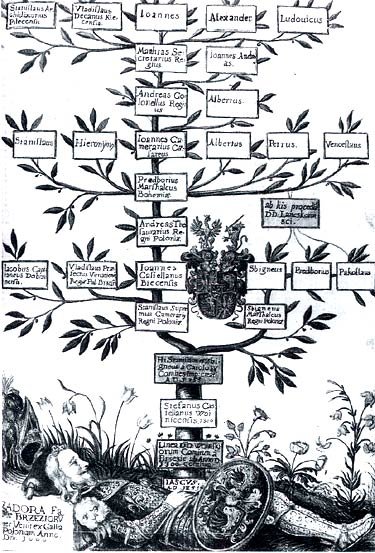Social Mobility: Lower Everywhere Than Generally Believed
Egalitarianism, Gregory Clark, Social Mobility

The legendary knight Zadora (supposed ancestor of the Polish Lanckoroński family) lies happy in his grave, contemplating with satisfaction the array of illustrious future generations (literally) springing from his loins.
Gregory Clark, who studies family mobility in various countries over the centuries, wants to puncture some mythical contemporary assumptions and expectations.
Studies of social mobility using surnames suggest two things. Social mobility rates are much lower than conventionally estimated. And social mobility rates estimated in this way vary little across societies and time periods. Sweden is no more mobile than contemporary England and the USA, or even than medieval England. Social mobility rates seem to be independent of social institutions (see the other studies on China, India, Japan and the USA now linked here). …
Conventional estimates of social mobility, which look at just single aspects of social status such as income, are contaminated by noise. If we measure mobility on one aspect of status such as income, it will seem rapid.
But this is because income is a very noisy measure of the underlying status of families. The status of families is a combination of their education, occupation, income, wealth, health, and residence. They will often trade off income for some other aspect of status such as occupation. A child can be as socially successful as a low paid philosophy professor as a high paid car salesman. Thus if we measure just one aspect of status such as income we are going to confuse the random fluctuations of income across generations, influenced by such things as career choices between business and philosophy, with true generalised social mobility.
If these estimates of social mobility were anywhere near correct as indicating true underlying rates of social mobility, then we would not find that the aristocrats of 1700 in Sweden are still overrepresented in all elite occupations of Sweden. Further, the more equal is income in a society, the less signal will income give of the true social status of families. In a society such as Sweden, where the difference in income between bus drivers and philosophy professors is modest, income tells us little about the social status of families. It is contaminated much more by random noise. Thus it will appear if we measure social status just by income that mobility is much greater in Sweden than in the USA, because in the USA income is a much better indicator of the true overall status of families.
Many commentators automatically assume that low intergenerational mobility rates represent a social tragedy. I do not understand this reflexive wailing and beating of breasts in response to the finding of slow mobility rates. The fact that the social competence of children is highly predictable once we know the status of their parents, grandparents and great-grandparents is not a threat to the American Way of Life and the ideals of the open society.
One ray of sunshine for those with a passion for upward mobility ought to be the reflection that History has not always been kind to families of talent and distinction. One key factor in the spectacular story of American development and success is the fact that America has provided a refuge and a second chance at opportunity to History’s losers. From the cavaliers who were defeated in England’s 17th century Civil War to my own Lithuanian ancestors dispossessed and occupied by Russia, the New World offered escape from ruin at home and (over time, at least) another chance.



